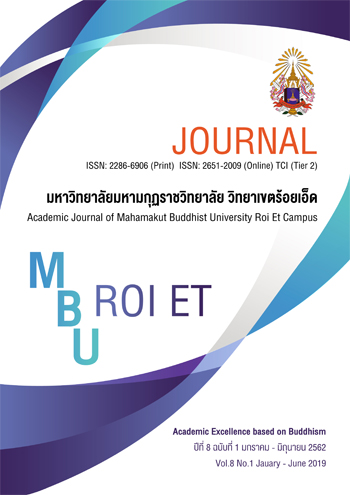The Impacts on Family Institutions Changes of the Elderly in Thailand’s Rural Northeast Region
Main Article Content
Abstract
The research entitled “The Impacts on Family Institutions on Changes of the Elderly in Thailand’s Rural Northeast Region” served the purposes to study: 1) current states of family institutions and the elderly, 2) impacts on changes of the former on the latter, 3) future trends of interactions between the former and the latter, 4) the application of Buddhism’s dharma called ‘Four Sublime States of Mind (Brahmavihara)’ to creating strong ties between the elderly’s family members. The number of the sampling groups was derived from simple random sampling and random table to set the sampling sizes using Taro Yamane, earning 393 individuals. Tools used to cooect data interview. Statistical analysis.
Results of the research have found the following findings:
1.Current states of families and the elderly are conducive to the fact that families in Thailand’s rural northeastern region have undergone striking changes in many domains. From extended families, they Tence become small ones. The family sizes appear smaller and smaller. Employments of jobs have completely changed; job seekers have to travel in the distance to look for their jobs. Warm circumstance of all family members in unison have turned silent and lonely, leaving the elderly and young kids behind. The case in point is how states of families have greatly changed, the elderly have remained satisfied with original ways of their life in traditional cultures. Adaptation for changes deems marginal.
2. Impacts on changes in family institutions the elderly sustain physical fatigues, emotional turbulence, social ties and mental well beings. Typically, they have both negative and positive impacts on the elderly. Their other impacts of changes are: they find no time enough to take a rest as they require, they shoulder more responsible burdens, their emotional ties are turbulent, their limited boundary of social ties has become narrower. Their additional worries involve their children and kids working in the distance, their own health, debt and family economy.
3. Future trends of interactions between family members and the elderly entails the latter’s expected trends towards interactions between the former and the latter in many years to come. Mainly, most of the elderly realize that economic conditions are going to be tense and tough. Unavoidably, seeking for a job in the distance will definitely increase. They also perceive how the situations are going on. However, local cultures highlighting great significance of the blood ties-related family system a acted as a retarding tool to maintain strong and good ties between family members and the elderly to have remained everlasting.
4. The application of Buddhism’s rule of dharma to creating good and strong ties between family members and the elderly have proven that every family member takes its stringent rule though it is instrumental in self-development prior to spending their life in the external world with countless problems. In reality, both sides follow this rule of dharma and treat it as the highest benefit. As a result, their ties have so far become the determinant for setting frames of family members’ code conducts and practices, enabling them to live a normal life in the society.
Article Details
References
นพวรรณ หาญพล. (2535). ความสัมพันธ์ระหว่างสัมพันธภาพในครอบครัว ประสบการณ์เกี่ยวกับเหตุการณ์เปลี่ยนแปลงในชีวิตกับคุณภาพชีวิตของผู้สูงอายุ. ขอนแก่น : มหาวิทยาลัยขอนแก่น.
เพ็ญแข ประจนปัจจนึก และ อ้อมเดือน สดมณี. (2529). การยึดหลักทางศาสนาในการดำรงชีวิตของชาวชนบทไทยและแนวโน้มของการเปลี่ยนแปลง. รายงานการวิจัย. กรุงเทพมหานคร : มหาวิทยาลัยศรีนครินทรวิโรฒ ประสานมิตร.
วีรสิทธิ์ สิทธิไตรย์ และโยธิน สว่างดี. (2536). การสนทนากลุ่ม : เทคนิคการวิจัยเชิงคุณภาพการวิจัยเกี่ยวกับผู้สูงอายุและการเปลี่ยนแปลงในภาคตะวันออกเฉียงเหนือ. พิมพ์ครั้งที่ 2. กรุงเทพมหานคร : สมาคมวิจัยเชิงคุณภาพแห่งประเทศไทย จุฬาลงกรณ์มหาวิทยาลัย.
ศรีน้อย มาศเกษม. (2532). พฤติกรรมการบริโภคอาหารของผู้สูงอายุในชนบทอีสาน ศึกษา ณ หมู่บ้านตำบล โนนคอม กิ่งอำเภอภูผ่าม่าน จังหวัดขอนแก่น. วารสารศรีนครินทร์เวชสาร. 4(4). 266-274.
ศิริลักษณ์ จันทร์น้อย. (2528). ความสัมพันธ์ระหว่างภาพเกี่ยวกับตนเองกับการมีส่วนร่วมในกิจกรรมชุมชนของผู้สูงอายุในอำเภอบัวใหญ่ จังหวัดนครราชสีมา. วิทยานิพนธ์ปริญญาครุศาสตร มหาบัณฑิต. บัณฑิตวิทยาลัย : จุฬาลงกรณ์มหาวิทยาลัย.


